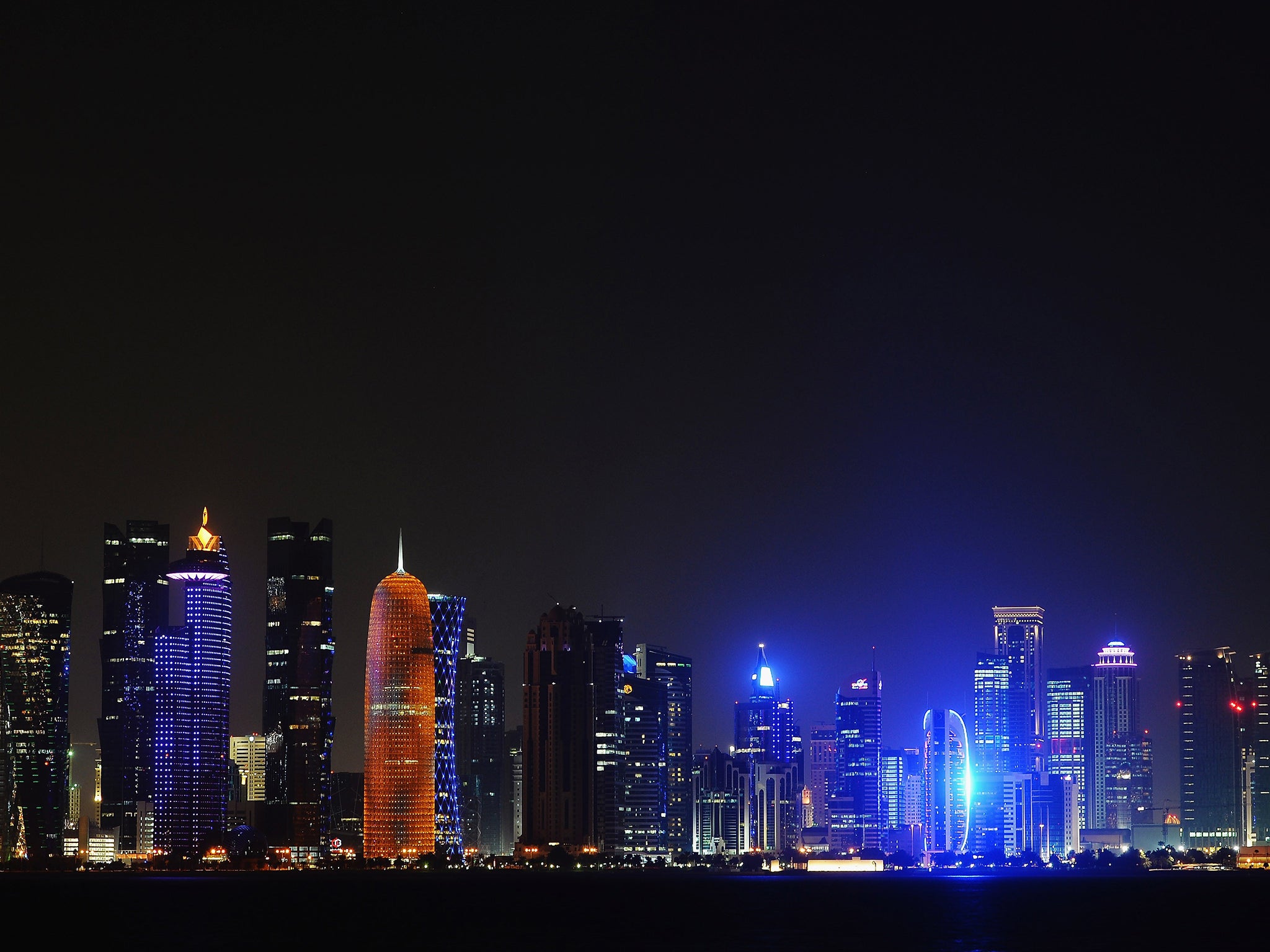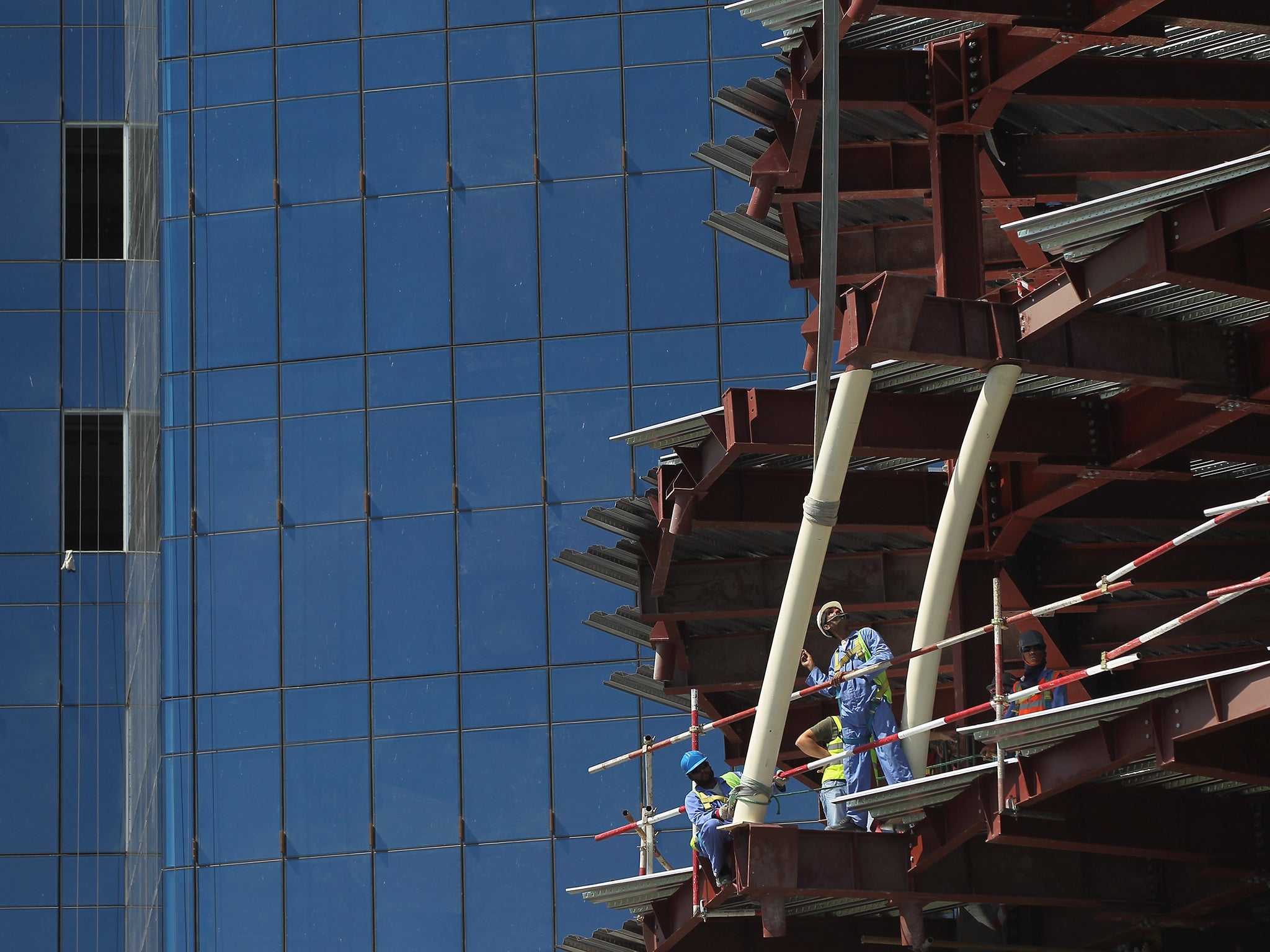Investment in tomorrow helps Qatar try to improve its reputation
Royal admits to Doha's 'mistakes' over rights for migrant workers, but hopes creative education conference shows a different side to Qatar

Like an electric-powered mirage, the vertiginous skyline of Doha shimmers on the night-time horizon, rising up from land that until only a few years ago was still just dust.
It’s a beguiling sight that could lead first-time visitors to the Qatari capital – or those who have not been here for years – to wonder if they should rub their eyes at the sight of cranes and skyscrapers rising across the bay, as convoys of taxis bring guests to the city from its vast and brand new Hamad International Airport.
This week, many of the vehicles caught up in Doha’s traffic jams have been carrying delegates to an event the Qatar Foundation has fashioned out of nothing to become the world’s leading education conference. Here at Wise 2014 (World Innovation Summit for Education), academics, charity workers, teachers and politicians from across the globe have given lectures and held seminars – as well as sharing their thoughts on creative learning, this year’s theme, on the dance floors of late-night hotel bars.
It’s not as headline-grabbing or as controversial as the 2022 World Cup (more on that later), but this is arguably a more vital part of Qatar’s effort to attract the talent and investment that will put it on the world stage. For a small desert country that knows it must invest its oil and gas billions well before they run out, there is one phrase repeated over and over here: “turning a carbon-based economy to a knowledge-based one”.
Wise was founded by Her Highness Sheikha Moza bint Nasser, the second wife of the previous emir who abdicated in favour of his son last year, but it is chaired by another royal: Dr Abdulla al-Thani.

Meeting The Independent in an office inside the gargantuan Qatar National Convention Centre, wearing the traditional white robes and sandals allowed only for indigenous Qataris, Dr al-Thani – or to use his full name, His Excellency Sheikh Abdulla bin Ali al-Thani – appears every bit the benevolent royal.
He has devoted himself to education, having served as a civil engineering lecturer and now working as president of the Hamad Bin Khalifa University. He speaks passionately about the need for international work on “how to deal with school interruptions during conflicts, how to bring girls in certain parts of the world back to school, utilising technology in the best way”. Wise is winning hearts and minds by supporting charities such as Camfed, the British charity improving female access to education in Africa. It was awarded £500,000 this week in recognition of the work of its founder, Ann Cotton.
“We are never satisfied because education needs us to do more and more to overcome challenges,” he says.
Of course, the conference has also served as a timely public relations opportunity.
The country has faced increasing accusations of fostering links to Isis and other Islamic militants. The new Emir, Sheikh Tamim bin Hamad Al Thani, has insisted these are untrue, saying last month that Qataris “don’t fund extremists,” and describing Isis and other militants in the area as “terrorist movements.”
But a week on from the monarch’s repeated assurances to David Cameron during his visit to the UK, rumours still abound. Reuters reported earlier this week that cars bearing Isis logos had been spotted driving around the affluent West Bay area.
The controversy surrounding the 2022 World Cup is not going away either. Despite numerous allegations that corruption and bribes helped Qatar’s bid win, there are few indications Fifa will reconsider its choice for the tournament.
On Monday, world football chiefs meet in Zurich to begin final negotiations on when the tournament should be hosted – a thorny issue for the organisers of domestic leagues worried by the tournament interrupting their games, and players concerned at any prospect of playing in 40C heat.
But perhaps the most damaging problem for Qatar’s reputation has been labour rights, following exposés on the horrific conditions endured by migrant workers building the stadiums and infrastructure needed for the tournament. Numerous cases of builders working 12 hours a day and seven days a week on unsafe sites, being unable to reclaim their passports to leave the country under the kafala work sponsorship system, and even dying in their hundreds at a rate of one a day, have been well documented.
Dr al-Thani admits “there have been some mistakes”.
“Qatar expanded very fast in the past 15 years and I think that, although the government put the regulations in place, some companies always try to get around that,” he says. “The government want to overcome this issue, and want the wellbeing of the workers to be assured.” He insists the same problems exist across the Gulf.
“[World Cup] 2022 brought a lot of attention. If you travel in the region, I don’t think others are doing something [about workers’ rights] in the way we are doing. Actually I think we are more advanced in how we put our regulations in. But I cannot tell you that there are no mistakes happening by certain companies or contractors, because of course they want to make money out of this.”
The reason workers’ rights are relevant to Dr al-Thani is that even the construction of his pet project, Education City – a university hub formed by eight institutions from around the world, including University College London – has come under question. The Labour MP Alison McGovern pressured UCL to “stamp out unacceptable employment practices” among migrant workers after evidence emerged of abuses on the Doha site, and the university promised to raise concerns with the Qatar Foundation that Dr al-Thani serves as education Vice President.

“One of the campuses was very much concerned about labour safety and labour wellbeing and we worked with them to set the rules and the regulations to be able to manage that. I think that was the first project we’ve done with zero accidents on site.” He adds that Education City has “put very strong rules on our contractors and companies that are working here. Some of them actually come to me and complain and say it’s almost impossible to operate because you are asking for them to put the workers in seven-star hotels – this is what they are saying. But it’s really strict, we’ve put real regulations in.”
Human Rights Watch and Amnesty International argue more needs to be done across the whole Qatari economy. In a report next week, Amnesty is expected to say many problems remain unresolved, despite Qatar announcing six months ago it would scrap and replace parts of the kafala system. If the UK and other countries are to work with the Qataris – and Whitehall has produced papers detailing the opportunities for British firms to win lucrative contracts in Doha’s education spending spree – then plenty of care needs to be taken in ensuring they do not become involved in more labour scandals. But there will be hope that Dr al-Thani’s willingness to acknowledge the abuses indicates an acceptance that further reform is needed, and can be achieved.
His links to Britain and familiarity with the West may also raise expectations. After studying for a degree in Qatar and heading to the US for his master’s, it was first to Queen Mary University of London and then to Southampton University that Dr al-Thani came to complete his PhD.
“Being blessed with three systems of education was very good and helpful because I understand how things are operating in different countries,” he says.
He wasn’t overly taken by Southampton itself, he admits – “very industrial” he says of the port city - but he enjoyed the surrounding countryside. Hampshire feels a long way away from the fake plastic grass verges installed at Education City. Perhaps there are some things even Qatari billions can’t change.
Join our commenting forum
Join thought-provoking conversations, follow other Independent readers and see their replies
Comments